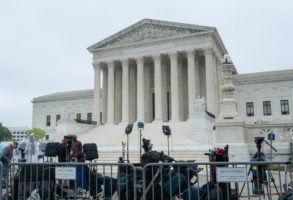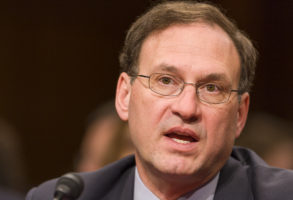Published June 25, 2015
On June 9, in a speech before an association of Catholic health-care administrators, President Obama made the case for Obamacare in terms no doubt intended in part to shape the public debate around the case of King v. Burwell, which the Supreme Court decided today. The case involved the question of whether it is lawful to provide through exchanges created by the federal government subsidies that the law said should be provided through exchanges created by the states. The letter of the law would seem to suggest not, so the president made a concise and forceful version of the case that Obamacare’s defenders have ultimately had to resort to in response, which is that this particular law shouldn’t be thought of as a law. He said:
So five years in, what we are talking about is no longer just a law. It’s no longer just a theory. This isn’t even just about the Affordable Care Act or Obamacare. This isn’t about myths or rumors that folks try to sustain. There is a reality that people on the ground day to day are experiencing. Their lives are better. This is now part of the fabric of how we care for one another. This is health care in America.
Arguments like this, which seek to treat Obamacare as deeply entrenched in the fabric of American life and so no longer properly a subject for debate, have been part of the public justification for this law from the very moment of its enactment. But the president’s remarks emphasized the super-legal status implicitly afforded to Obamacare under this line of reasoning, which is an element of the argument that has been especially prominent and important in the debate surrounding the King case. Obamacare should be understood not as a particular statute implemented in a particular way, this argument suggests, but as equivalent to the broad desire to improve the health-care system, or indeed as equivalent to that system itself.
And that is roughly the position that Chief Justice John Roberts, writing for a Supreme Court majority of six, articulated in today’s decision. The nature and character of that argument, much more than the specific implications of the decision for America’s continuing health-care debate, seem likely to make this decision a lasting and consequential one—and unfortunately not in a good way.
As a matter of policy substance, today’s ruling in favor of the administration is a status quo decision: The law can continue to be implemented as it has been, and the debate about its merits and demerits will therefore continue largely as it has been too. We will no doubt hear from some on the Left that the law is now entrenched and the debate should now end, as, again, they have been arguing from day one. It is certainly nice to see liberals discover the virtues of protecting ingrained institutions that form the fabric of American life, but they’ve picked an odd one to start with, and their arguments about its permanence are about as valid as they’ve ever been.
Replacing this law with a market-based reform remains as crucial as ever, and should be (and very likely will be) a very high priority for the next Republican presidential nominee. This case accelerated some of the relevant work and internal debates on that front on the Right, but, given how it has been decided, it doesn’t seem likely to change the basic dynamics of the health-care debate looking toward 2016.
But this decision will be more significant than I would have expected a decision for the government to be because of the argument offered up by the Chief Justice. Roberts could have tried to limit the effects of this decision by sticking to a set of fundamentally textual arguments about the meaning of the term “established by the state” in the context of the statute as a whole. The decision does offer such arguments, and Justice Roberts does what he can to minimize their incoherence, to contend with the fact that the words in question seem to have a fairly straightforward meaning, and to offer some responses to Justice Scalia’s devastating critique of the majority’s textual reasoning in his dissent.
But the Chief Justice didn’t leave it at that. He makes a much broader argument about the relationship between the vague, broadly stated aims and purposes of legislators and the role of judges interpreting the meaning of the particular laws those legislators then write. Roberts presses this point most firmly at the end of his decision, writing: “Congress passed the Affordable Care Act to improve health insurance markets, not to destroy them. If at all possible, we must interpret the Act in a way that is consistent with the former, and avoids the latter.”
In effect, this is a version of the president’s argument: Obamacare is not so much a particular law as an overarching desire “to improve health insurance markets” and so if at all possible it should be taken to mean whatever one believes would be involved in doing so. From the beginning of its implementation of this statute, that Obama administration has treated the words of the statute as far less relevant than the general aim of doing what it thinks would improve health insurance markets, and today the Supreme Court essentially endorsed this way of understanding the law and suggested it is how judges should think about laws more generally too.
This understanding of the role of the judge threatens to undermine the rule of law in the American system of government, because it undermines the central place assigned to written law, and to the legislator, in that system. Ironically, I think the Chief Justice intends his decision to be deferential to the Congress—to keep the Court’s footprint small in this arena by not reading laws in ways that require large transformations in the forms of their administration. But in effect, this is more contempt than deference. While it would seem to suggest that the will of the legislator should guide the system, in fact it means that the word of the legislator does not govern the other branches. It implies that Congress should have just passed a law that said “health insurance markets shall be improved,” and then left it to the executive agencies to decide how they wish to do that while judges nod in approval.
But Congress is elected by the public, based in part on how its members explain their views to the public (including their views of how things like health insurance markets might be improved) and in part also on the public’s assessment of whether their attempted improvements in fact improve things. Members of Congress express their will through the particulars of the legislation they craft and enact, and when those particulars are flawed, contradictory, counterproductive, or misguided (and they are all of those things in this case) our system does not expect judges to provide the words of the statue with different meanings based on their own assessments of how the vague, broadly stated goals of the legislators might have been better achieved.
Justice Scalia presses this point in his dissent, writing:
The Court’s decision reflects the philosophy that judges should endure whatever interpretive distortions it takes in order to correct a supposed flaw in the statutory machinery. That philosophy ignores the American people’s decision to give Congress “[a]ll legislative Powers” enumerated in the Constitution. They made Congress, not this Court, responsible for both making laws and mending them. This Court holds only the judicial power—the power to pronounce the law as Congress has enacted it. We lack the prerogative to repair laws that do not work out in practice, just as the people lack the ability to throw us out of office if they dislike the solutions we concoct.
But Roberts’s argument runs even deeper than that. It suggests that when a law as written would be likely to have practical consequences at odds with the broadly asserted intent of its authors, judges should interpret it to have a meaning more likely to achieve that desired goal. If the words “exchange established by the state” meant only an exchange established by the state and not also one established by the federal government, the system set up by the law might quickly collapse, Roberts notes. And Scalia responds, “If true, these projections would show only that the statutory scheme contains a flaw; they would not show that the statute means the opposite of what it says.
They are arguing, in a sense, about whether it is possible for Obamacare to be a badly designed law, and indeed whether it is a law in the traditional sense at all, or whether, as the president asserted earlier this month, it is something more than that. In the face of both a constitutional challenge in 2012 and a legal challenge now, the case for Obamacare has been that it just shouldn’t be treated like a law. And Justice Scalia rightly worries that this is no way for the Court to approach a statute, and that it will be difficult to keep this special treatment constrained to this law alone. He writes:
Perhaps the Patient Protection and Affordable Care Act will attain the enduring status of the Social Security Act or the Taft-Hartley Act; perhaps not. But this Court’s two decisions on the Act will surely be remembered through the years. The somersaults of statutory interpretation they have performed (“penalty” means tax, “further [Medicaid] payments to the State” means only incremental Medicaid payments to the State, “established by the State” means not established by the State) will be cited by litigants endlessly, to the confusion of honest jurisprudence. And the cases will publish forever the discouraging truth that the Supreme Court of the United States favors some laws over others, and is prepared to do whatever it takes to uphold and assist its favorites.
In this way, the Chief Justice’s strange and gratuitous argument stands to make King v. Burwell a more significant case than it could have been even had the Court ruled for the plaintiffs—a case that diminishes our constitutional system and that exacerbates what is at the moment its most significant problem: the weakness of the Congress.
The health-care debate, in the context of which this case might originally have been understood, will continue because what Justice Roberts insists is impossible is true: Obamacare is a law that was intended to improve insurance markets but was designed in a way that will actually harm them. We can only hope that debate will ultimately be resolved in a way that also pushes back against the unexpected implications of this case and this decision by reasserting the supremacy of the law. It has long been clear that Obamacare was digging a deep hole out of which conservatives would have to help the country to climb. But today’s decision has left it deeper than ever.
— Yuval Levin is the Hertog Fellow at the Ethics and Public Policy Center.








